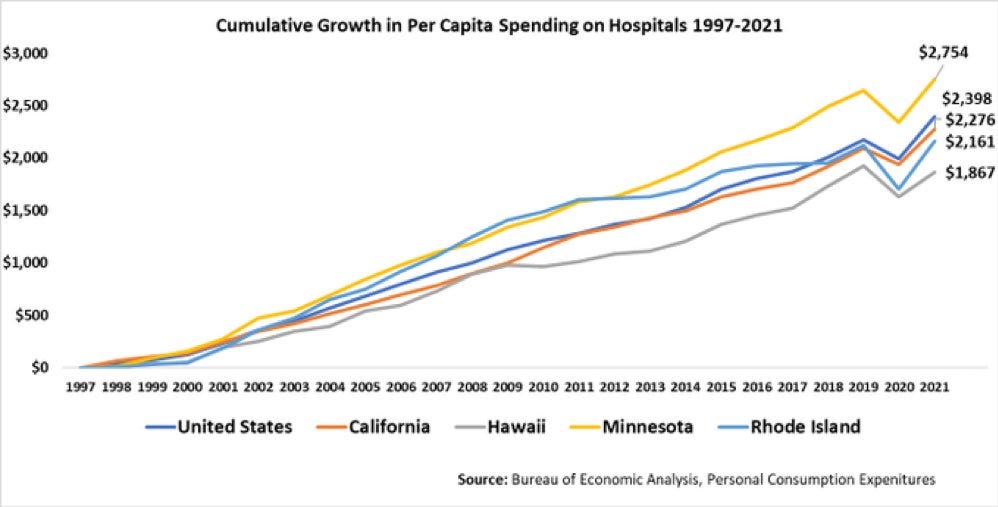How Minnesota Took on Hospital Monopolies and Won
PLUS: Five updates, and they're all good news.

This is Boondoggle, the newsletter about corporations ripping off our states, cities, and communities. If you’re not currently a subscriber, please click the green button below to sign up. Thanks!
Minnesota Democrats (officially the Minnesota Democratic–Farmer–Labor Party) had a hugely productive 2023 legislative session, which wrapped up on Monday night. A surprising flip of the State Senate during the 2022 election gave Democrats unified control of the state government for the first time in a decade, and they used it to pass a host of legislation on voting rights, gun control, health care, education, transportation, and on and on.
The sheer amount of legislation was especially impressive considering that the Democrats’ state senate majority was a single vote, meaning they could lose no one on any priority bill.
I want to focus on one piece of legislation in particular — HF 402, sponsored by Rep. Robert Bierman and Sen. Melissa Wiklund — that strikes a key blow at hospital monopolies (and even managed to pick up one Republican vote in each chamber along the way). With the increasing attention being paid to hospital monopolies, and with the hard elbows thrown by large health care systems in the political process when their power is threatened, it’s a great example of how legislators can stand up to entrenched interests to the benefit of patients, workers, and communities.
The focus on hospital monopolies in Minnesota intensified this year, as I wrote before, due to the proposed merger between Fairview, a Minnesota system that encompasses the hospital connected to the University of Minnesota Medical School, and Sanford, a South Dakota-based hospital chain with a dodgy history.
That merger has been opposed by medical workers, including the Minnesota Nurses Association, medical students, the medical school administration, the Minnesota Farmers Union, and lots of others, with good reason. Hospital monopolies in general, and Sanford’s record in particular, tend to lead to reduced access to care, higher prices, and lower wages for workers, in addition to other clear harms.
HF 402, which Gov. Tim Walz signed into law on Friday, creates what’s known as a “public interest standard” for mergers. It prohibits mergers that would “substantially lessen competition or tend to create a monopoly or monopsony,” and gives the Minnesota attorney general the ability to examine mergers and go to court to block them due to negative effects across a host of areas of concern, including: If the merger would harm public health, reduce access to care, increase costs to individuals or total healthcare spending, or if it would negatively affect wages or collective bargaining agreements for workers.
So, as it says on the tin, if the public interest were to be harmed by the merger, it can be blocked. The new law also creates a health care merger notification regime, where deals involving entities with more than $80 million in annual revenue need to be affirmatively flagged for the attorney general.
About a dozen states have some version of a public interest standard, giving either their attorney general or state health department the ability to seek to block mergers that will negatively impact access to care, but the one included in HF 402 is one of the most robust, and has that explicit focus on not just health outcomes but labor effects.
That’s very much in line with the increased attention being given to the effect monopolies have on workers when they are able to corner labor markets, in industries from retail, to delivery drivers, to nurses and other health care workers. Across the country, health care workers have seen both their pay and their working conditions head down a slope thanks to the increasing power of the large health systems that employ them. HF 402 is a very affirmative declaration that those deteriorating conditions are a public concern.
The bill is also the rare one that actually got stronger as it made its way through the legislative meat-grinder. The initial version gave the authority to examine and block mergers to the Department of Health, rather than the attorney general, and the labor provisions were much weaker. The only piece that got weakened a bit is the notification regime, which saw the threshold bumped up from $40 million to $80 million during the final stretch.
That’s a distinct difference from another piece of Minnesota legislation having to do with nursing staffing ratios, which was gutted at the last minute after the Mayo Clinic, one of the most powerful of Minnesota health care industry players, objected and threatened to pull back on significant planned investments in the state were it to pass.
Why was that the case? I’m just guessing, but the looming specter of the Fairview-Sanford certainly helped, as did the fact that spending on Minnesota hospitals is growing faster than it is in states that have more oversight. (Chart courtesy of Justin Stofferahn, the anti-monopoly director at the Minnesota Farmers Union.) That the University of Minnesota medical school was wrapped up in the consolidation scheme was also clearly a driving force, as was the fact that labor so staunchly supported the bill.
But the bill also simply fits with where lots of advocates and policymakers understand measures to address health care consolidation — and antitrust more broadly — need to go: Away from focusing so intently on the potential price and so-called “efficiency” benefits of mergers and toward trying to grapple with the harms that radiate out onto not just consumers, but other businesses and workers too. During debate, even the Republicans who opposed the bill felt compelled to pay a lot of lip service to concerns about health care and hospital consolidation, which is a promising sign for the long term.
What’s next? Well, Sanford and Fairview maintain that their merger can still pass scrutiny under the new rules. So it’s possible we’re going to get a high-profile test of the new regime right out of the gate. And I expect, if it becomes law, this will be paying dividends for Minnesota communities for a long time.
Correction: An earlier version of this post incorrectly said Walz signed the bill on Wednesday. He didn’t sign it until Friday, May 26. I regret the error.
COOL EVENT: If you’re in or around the Trenton, New Jersey, area, I’ll be speaking at New Jersey Policy Perspective’s “Budget and Brews” event on June 1. Sign up to attend here.
UPDATE: Speaking of Minnesota, the state legislature there also voted to make worker noncompete agreements void and unenforceable across the board, the first state to take such a step since the Federal Trade Commission announced its major move to ban noncompetes. If the governor signs the bill into law, Minnesota will join California, North Dakota, and Oklahoma in rendering all noncompetes unenforceable. Special shoutout to Sen. Alice Mann for being such a vital force on this one.
UPDATE II: A California bill to ban exclusivity clauses in the ticketing industry, which would be a vital first step in tackling Ticketmaster’s monopoly power, as I explained here, is through the committee process and headed for a vote before the full State Senate. Big kudos to Sen. Scott Wilk for championing this one.
UPDATE III: Earlier this year, my colleagues and I released a report, alongside some powerhouse Pennsylvania lawmakers, detailing how the University of Pittsburgh Medical Center, known as UPMC, built a monopoly that it uses to harm workers, patients, and communities across Western Pennsylvania. Now, a labor coalition has filed an antitrust complaint with the Department of Justice against UPMC, making many of the same allegations about monopoly power lowering wages and degrading conditions for front-line health care workers. Good stuff.
UPDATE IV: Disney has pulled the plug on its proposed corporate campus in Lake Nona, Florida, due to its ongoing feud with Florida Gov. and 2024 presidential hopeful Ron DeSantis. This will save Florida taxpayers the $570 million Disney was due to receive, which would have been the largest corporate subsidy package in Florida history. I’m going to go ahead and call this one a win, whatever the silly reasons behind it.
UPDATE V: Regular readers known I am no fan of the tax prep industry in general, and Intuit (the owner of Turbotax) in particular, because of the way in which it conspires to keep taxes complicated and to ensure that billions are spent annually by Americans who are just trying to do their civic duty. The IRS finally announced last week that it’s piloting a government-run, free electronic filing system. Here’s hoping it moves from pilot to widespread reality in the not-too-distant future.
Thanks for reading this edition of Boondoggle. If you liked it, please take a moment to click the little heart under the headline or below. And forward it to friends, family, or neighbors using the green buttons. Every click and share really helps.
If you don’t subscribe already and you’d like to sign up, just click below.
Thanks again!
— Pat Garofalo



